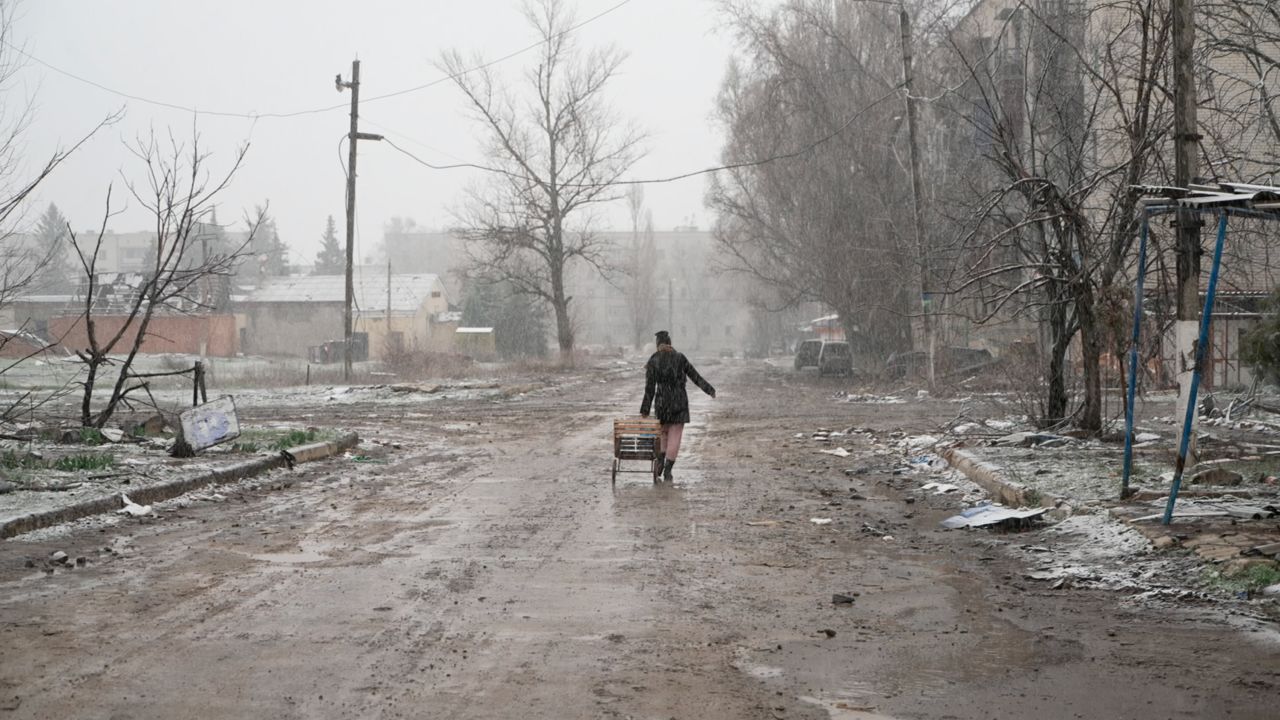[ad_1]
Konstantinivka
CNN
—
“God protects me,” says 73-year-old Tamara. She’s one of the few people who have stayed in the town of Konstantinivka, eastern Ukraine.
“If there is a need, God will save me. If not,” she adds with a shrug, “it is what it is.”
Tamara has lived in the same flat for the past 40 years. Her son, a drug addict she says nonchalantly, is in Russia. Her husband died long ago. Now, it’s just her and her cat.
Konstantinivka is 22 kilometres, about 13.5 miles west of the city of Bakhmut, scene of some of the most intense fighting in the war.
Tamara is waiting for a bus home, sitting on a broken wooden bench in the square which also serves as the town’s main taxi stand.
On this day there is only one taxi with a sign on the windshield offering rides to Dnipro, a four-hour drive to the west, far away from the frontlines. There are no takers.
Occasionally the air shakes with distant explosions.
Stray dogs prowl the center of the square, on the lookout for scraps. In January when I was last here, they hung around sandwich and kebab shops. The shops are now all shuttered.
On the ground next to Tamara is a shopping bag containing her purse and a few groceries. She says she can’t survive on her monthly pension, amounting to about fifty dollars. She supplements it with food shared by soldiers passing through town. When all else fails, she says, she begs.
Tamara wears scuffed and dirty white running shoes, the laces untied. Her feet don’t reach the ground.
Earlier this week missiles struck an apartment building in Konstantinivka, killing six people.
As she waits for the bus, Tamara quickly crosses herself.
The towns and villages close to the fighting are largely abandoned. As the fighting in Bakhmut rages on – the battle has been going on for more than seven months – Russian shells and missiles land in communities well away from the front lines.
What passes for normal life is a thing of the past here. Many of the windows in houses and apartment buildings in Konstantinivka have been blown out. Remaining residents nail plastic sheeting to the window frames to keep out the cold.

Running water and electricity are intermittent at best.
In the courtyard of a crumbling Soviet-era apartment block, Nina, 72, surveys the wreckage around her. An incoming missile hit a shed, shredding trees, throwing mangled sheets of metal in all directions, splattering shrapnel on surrounding walls.
“I’m on the last breath of survival,” she sighs. “I’m on the verge of needing a psychiatrist.”
What keeps her sane, she tells us, are her flat mates – five dogs and two cats.
“In the market they tell me I should feed myself, not my cats and dogs,” she says, a smile creeping onto her wrinkled face.
As we speak another old woman in a stained winter coat trudges by, dragging a bundle of twigs to heat her home.
An eerie metallic squeak echoes across the courtyard as a young girl, perhaps 10 or 11 years-old, sways on a rusty swing. Her face is blank. For more than half an hour she goes back and forth, back and forth, back and forth.
Since shortly after the war began more than a year ago Ukrainian officials have urged the residents of communities near the worst of the fighting to evacuate to safer ground.
Many have heeded the call but often the elderly, the infirm and the impoverished insist on staying put. And try as they might to persuade the hesitant, the government hasn’t the manpower and resources to forcibly evict them.
In the town of Siversk, northeast of Bakhmut, barely a structure has been left undamaged. On the main road, incoming artillery shells have left gaping holes, now full of water.
At the entrance to an apartment building, Valentina and her neighbour, also named Nina, are getting a bit of fresh air. They pay no mind to the Soviet-era armoured personnel carrier parked next to the building opposite them.
Every night, and often almost every day, Nina and Valentina must huddle in their basement, which doubles as a bomb shelter. Nina’s husband is disabled and never leaves the basement.
Here, there is no running water, no electricity, no internet, so mobile signal. I only found one small store open.
Valentina struggles to look on the bright side. “It’s fine” she responds in a loud, confident voice when I ask how she is. “We put up with everything!”
“What do we feel?” responds Nina in a quivering voice. “Pain. Pain. When you see something destroyed you tear up. We cry. We cry.”
Valentina’s mask drops, she nods, and her eyes fill with tears.
[ad_2]
Source link






